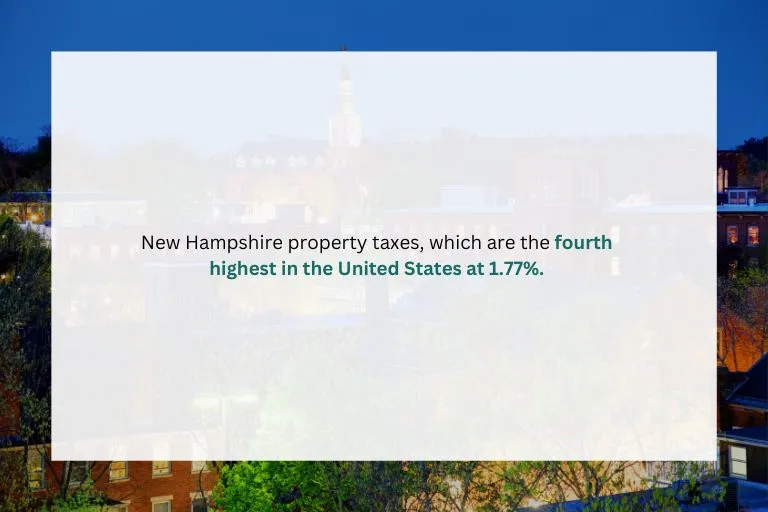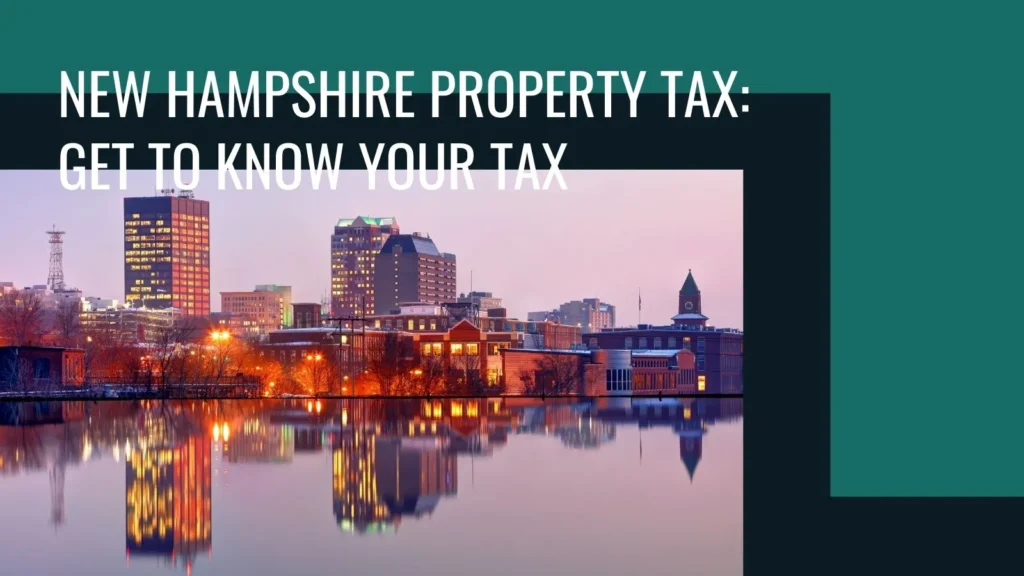New Hampshire offers a unique tax environment by not imposing personal income or sales taxes. Instead, the state relies heavily on property taxes to fund local services. In 2024, understanding how property taxes work in New Hampshire is crucial for homeowners and potential buyers alike.
How the New Hampshire Property Tax Works
Property taxes in New Hampshire are a primary source of revenue, compensating for the absence of personal income and sales taxes. Here’s an overview of how the system operates:
- Assessment of Property Value: Each municipality appraises property values annually, typically based on market conditions and comparable sales.
- Tax Rate: Expressed in mills (1 mill = $1 per $1,000 of assessed value), tax rates vary by county, town, and school district.
- Effective Tax Rate: Calculated as a percentage of the property’s value, New Hampshire has an average effective property tax rate of 1.61% on owner-occupied housing.

Local assessors use mass appraisal methods to determine property values, ensuring consistency across different areas. If homeowners disagree with their property’s assessment, they can file an abatement request for a valuation review and potential tax refund.
New Hampshire Property Tax Rates by County
Property tax rates in New Hampshire vary significantly across counties. Below is a detailed table showcasing median home values, median annual property tax payments, and average effective property tax rates for each county:
| County | Median Home Value | Median Annual Property Tax Payment | Average Effective Property Tax Rate |
| Adams | $137,700 | $2,192 | 1.59% |
| Antelope | $82,100 | $1,071 | 1.30% |
| Arthur | $129,200 | $1,463 | 1.13% |
| Banner | $172,900 | $1,804 | 1.04% |
| Blaine | $77,700 | $1,250 | 1.61% |
| Boone | $131,700 | $1,387 | 1.05% |
| Box Butte | $129,200 | $2,038 | 1.58% |
| Boyd | $85,000 | $1,189 | 1.40% |
| Brown | $85,100 | $1,148 | 1.35% |
| Buffalo | $185,300 | $2,844 | 1.53% |
| Burt | $104,900 | $1,511 | 1.44% |
| Butler | $127,200 | $1,561 | 1.23% |
| Cass | $195,500 | $3,189 | 1.63% |
| Cedar | $121,800 | $1,389 | 1.14% |
| Chase | $139,200 | $1,679 | 1.21% |
| Cherry | $124,900 | $1,460 | 1.17% |
| Cheyenne | $98,700 | $1,917 | 1.94% |
| Clay | $102,500 | $1,571 | 1.53% |
| Colfax | $92,900 | $1,287 | 1.39% |
| Cuming | $129,100 | $1,629 | 1.26% |
| Custer | $116,900 | $1,514 | 1.30% |
| Dakota | $131,400 | $2,354 | 1.79% |
| Dawes | $125,200 | $1,746 | 1.39% |
| Dawson | $113,700 | $1,854 | 1.63% |
| Deuel | $89,800 | $1,312 | 1.46% |
| Dixon | $100,000 | $1,479 | 1.48% |
| Dodge | $137,100 | $2,173 | 1.58% |
| Douglas | $180,000 | $3,892 | 2.16% |
| Dundy | $76,900 | $884 | 1.15% |
| Fillmore | $89,200 | $1,306 | 1.46% |
| Franklin | $77,100 | $1,019 | 1.32% |
| Frontier | $111,100 | $1,551 | 1.40% |
| Furnas | $73,700 | $997 | 1.35% |
| Gage | $124,100 | $1,944 | 1.57% |
| Garden | $77,100 | $1,044 | 1.35% |
| Garfield | $106,000 | $1,383 | 1.30% |
| Gosper | $165,500 | $1,919 | 1.16% |
| Grant | $72,500 | $1,012 | 1.40% |
| Greeley | $74,200 | $1,147 | 1.55% |
| Hall | $153,800 | $2,507 | 1.63% |
| Hamilton | $163,900 | $1,796 | 1.10% |
| Harlan | $113,900 | $1,461 | 1.28% |
| Hayes | $81,000 | $1,204 | 1.49% |
| Hitchcock | $75,900 | $1,005 | 1.32% |
| Holt | $126,000 | $1,512 | 1.20% |
| Hooker | $94,000 | $1,149 | 1.22% |
| Howard | $155,300 | $1,970 | 1.27% |
| Jefferson | $98,600 | $1,395 | 1.41% |
| Johnson | $104,700 | $1,593 | 1.52% |
| Kearney | $162,200 | $1,994 | 1.23% |
| Keith | $135,000 | $1,935 | 1.43% |
| Keya Paha | $65,000 | $918 | 1.41% |
| Kimball | $80,500 | $1,691 | 2.10% |
| Knox | $92,300 | $1,253 | 1.36% |
| Lancaster | $190,000 | $3,780 | 1.99% |
| Lincoln | $153,200 | $2,480 | 1.62% |
| Logan | $107,900 | $1,516 | 1.41% |
| Loup | $82,200 | $874 | 1.06% |
| McPherson | $78,900 | $1,146 | 1.45% |
| Madison | $155,200 | $2,203 | 1.42% |
| Merrick | $119,900 | $1,691 | 1.41% |
| Morrill | $103,200 | $1,409 | 1.37% |
| Nance | $78,400 | $1,145 | 1.46% |
| Nemaha | $97,200 | $1,495 | 1.54% |
| Nuckolls | $73,900 | $915 | 1.24% |
| Otoe | $145,100 | $2,336 | 1.61% |
| Pawnee | $71,400 | $1,103 | 1.54% |
| Perkins | $118,400 | $1,327 | 1.12% |
| Phelps | $139,900 | $1,935 | 1.38% |
| Pierce | $134,500 | $1,618 | 1.20% |
| Platte | $159,500 | $2,319 | 1.45% |
| Polk | $117,600 | $1,437 | 1.22% |
| Red Willow | $113,600 | $1,601 | 1.41% |
| Richardson | $73,700 | $1,049 | 1.42% |
| Rock | $92,100 | $1,138 | 1.24% |
| Saline | $120,800 | $1,864 | 1.54% |
| Sarpy | $211,400 | $4,614 | 2.18% |
| Saunders | $171,600 | $2,757 | 1.61% |
| Scotts Bluff | $130,400 | $1,996 | 1.53% |
| Seward | $172,900 | $2,526 | 1.46% |
| Sheridan | $78,200 | $1,242 | 1.59% |
| Sherman | $91,000 | $1,361 | 1.50% |
| Sioux | $108,800 | $1,551 | 1.43% |
| Stanton | $129,200 | $1,767 | 1.37% |
| Thayer | $69,900 | $945 | 1.35% |
| Thomas | $120,000 | $1,430 | 1.19% |
| Thurston | $77,700 | $1,276 | 1.64% |
| Valley | $110,500 | $1,671 | 1.51% |
| Washington | $204,900 | $3,231 | 1.58% |
| Wayne | $144,100 | $2,023 | 1.40% |
| Webster | $74,600 | $1,229 | 1.65% |
| Wheeler | $96,900 | $845 | 0.87% |
| York | $135,600 | $1,757 | 1.30% |
Hillsborough County
As New Hampshire’s most populous county, Hillsborough houses Manchester, the state’s largest city. The total tax rate in Manchester is 18.24 mills, with an average effective property tax rate of 2.23%.
Rockingham County
Located in southeast New Hampshire, Rockingham County residents face some of the highest property taxes in the state. The median annual property tax payment here is $6,890, significantly above the state and national averages.
Merrimack County
Merrimack County, situated in central New Hampshire, has the fourth-highest property tax rate among the state’s counties. With a median effective property tax rate of 2.52%, Concord, the county’s largest city, features a mill rate of approximately 25.89 mills.
Strafford County
In eastern New Hampshire, bordering Maine, Strafford County includes Dover and Rochester. It boasts a median effective property tax rate of 2.56%, resulting in approximately $5,120 in property taxes annually on a $200,000 home.
Exemptions and Credits
New Hampshire offers several property tax exemptions and credits to provide relief for specific groups:
- Elderly Exemption: Available for residents aged 65 or older who meet certain income and asset criteria.
- Veterans’ Exemption: Military veterans may qualify for additional exemptions based on their service.
- Low and Moderate Income Homeowners Property Tax Relief Program: Provides refunds to homeowners earning below specified thresholds.
Frequently Asked Questions
1. What are the state and local property tax collections per capita in New Hampshire?
In New Hampshire, the state and local property tax collections amount to $3,294 per person, ranking third nationally in property tax collections per capita.
2. What is the overall state and local tax burden in New Hampshire?
New Hampshire residents bear a state and local debt of approximately $7,032 per individual, with a funded ratio of 73% for public pension plans. The state ranks 6th on the 2024 State Business Tax Climate Index.
3. How much does New Hampshire collect in state and local tax collections per capita?
New Hampshire collects an average of $5,386 per person in state and local taxes.
4. Does New Hampshire have estate or inheritance taxes?
New Hampshire does not impose either estate or inheritance taxes, benefiting residents during estate planning and asset transfers.
5. What is the state and local individual income tax collection per capita in New Hampshire?
New Hampshire collects $107 per person in state and local individual income taxes.
6. What is the top corporate income tax rate in New Hampshire?
The highest corporate income tax rate in New Hampshire is 7.5%.
7. What is the corporate income tax rate in New Hampshire?
The corporate income tax rate in New Hampshire is 7.5%, impacting financial planning and tax liabilities for businesses.
8. Where does New Hampshire rank on the State Business Tax Climate Index?
New Hampshire ranks 6th on the 2024 State Business Tax Climate Index.
Where to Go for New Hampshire Property Tax Help
Ensure your property taxes are handled correctly with professional assistance. Whether it’s sales tax or the intricate New Hampshire property tax system, our expert advisors can manage it all and alleviate your financial burdens. Assess Your Tax Situation Today




 anywhere
anywhere  anytime
anytime